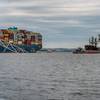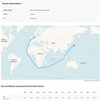The U.S. Department of Homeland Security today announced that the People's Republic of China formally joined the Container Security Initiative (CSI). U.S. Customs and Border Protection (CBP) Commissioner Robert C. Bonner and Mu Xinsheng, Commissioner of the General Administration of Customs of the People's Republic of China, today signed a declaration of principles in Beijing, formally initiating joint efforts to target and pre-screen cargo containers shipped from the ports of Shanghai and Shenzhen destined for U.S. ports. "CSI is an essential element of the layered security strategy of the United States," said Homeland Security Secretary Tom Ridge. "This agreement with the People's Republic of China is important for our efforts to protect not only the U.S., but also our global system of trade." CBP will deploy small teams of officers to be stationed at the ports of Shanghai and Shenzhen to target sea containers destined for the United States. Shanghai and Shenzhen Customs officials, working with CBP officers, will be responsible for screening any containers identified as a potential terrorist risk. "I am honored to be a part of this historic signing which follows the consensus reached in Crawford, Texas on October 25, 2002 by President George W. Bush and former President Jiang Zemin to join CSI in principle. We appreciate the continued support of CSI by President Hu Jintao," said Commissioner Bonner. "The CSI security blanket is now expanding and strengthening as it encompasses the ports of Shanghai and Shenzhen." Commissioner Bonner added: "CSI is the only formal program in operation today that is designed to detect and deter terrorists from exploiting the vulnerabilities of containerized cargo. We are getting CSI implemented in those ports that have signed on. We will continue to deploy teams to other participating ports as quickly as possible." CSI is an initiative that was developed by U.S. Customs in the aftermath of the terrorist attacks of September 11th. Now within the Department of Homeland Security, CBP is continuing to implement CSI at major ports around the world. Under the CSI program, a small number of CBP officers are deployed to work with host nation counterparts to target high-risk cargo containers. Its purpose is to protect containerized shipping from exploitation by terrorists. Containerized shipping is a critical component of global trade because most of the international trade moves or is transported in containers. CSI consists of four core elements: 1) using intelligence and automated information to identify and target high-risk containers; (2) pre-screening those containers identified as high-risk, at the port of departure, before they arrive at U.S. ports; (3) using detection technology to quickly pre-screen high-risk containers; and (4) using smarter, tamper evident containers. To date, 19 of the top 20 ports have agreed to join CSI and are at various stages of implementation. These ports are points of passage for approximately two-thirds of containers shipped to the United States. CSI is now operational in 15 ports including Rotterdam, LeHavre, Bremerhaven, Hamburg, Antwerp, Singapore, Yokohama, Hong Kong, Göteborg, Felixstowe, Genoa, La Spezia, Vancouver, Montreal, and Halifax. In June 2003, Homeland Security Secretary Tom Ridge and Commissioner Bonner announced that CSI will be expanding to strategic locations beyond the 20 initial major ports to include areas of the Middle East such as Dubai. CBP is also coordinating agreements with ports in Latin America, and other major ports in Asia and Europe. The governments of Malaysia, Sweden, Sri Lanka, and South Africa have also joined CSI. In Europe, CBP is looking to expand CSI to at least 11 additional ports to include Livorno, Gioia Tauro, and Naples, Italy.
Subscribe for
Maritime Reporter E-News
Maritime Reporter E-News is the maritime industry's largest circulation and most authoritative ENews Service, delivered to your Email five times per week










